 Duplicate
an existing SmartStore
Duplicate
an existing SmartStoreSmartStores are the second generation of storefront design in MarketDirect StoreFront (introduced in v. 7.0). SmartStores are platforms for building product catalogs and storefronts that use HTML5, AJAX, and other responsive technologies that enable the storefront to scale smoothly from desktop to mobile devices. SmartStores are buyer interfaces for your Web site that site administrators can tweak using the SmartStore Builder's customization toolset. These tools let administrators and site designers customize the layout of page elements and edit the site's HTML and CSS (cascading style sheets).
Building a SmartStore storefront using the SmartStore Builder involves six main tasks:
● selecting a design (layout and style)
● adding a branding logo
● defining product and category sections
● setting up a promotional banner
● editing page elements and styles
● associating companies with the storefront
Important Note
on SmartStores Web Browser Support: SmartStores will work only on the
following browsers:
— Google Chrome
— Mozilla Firefox
— Apple Safari
The supported image formats are JPG, GIF, PNG,
BMP.
The recommended size is 250 pixels by 70 pixels.
Image file size should not exceed
2 MB.
You can use a SmartStore theme “off the shelf” by adding your logo, selecting the products and categories to offer, and associating it with companies.
You can use the advanced customization tools to edit the look and feel of the site. Customizing your storefronts lets you tailor the branding of a storefront to a particular audience (i.e., buyers associated with a particular company, interested in a certain product line, etc.). With SmartStore storefront customization you can:
● Customize the color scheme to match your corporate identity (CSS style sheet editing).
● Change the typeface and style for heading levels or the color of buttons (CSS style sheet editing).
● Rearrange the layout of elements on a site page (HTML code editing).
● Customize a storefront with tailored branding for users associated with a particular company (CSS and/or HTML editing as well as tailoring the messaging, promotional banners, etc.).

 Duplicate
an existing SmartStore
Duplicate
an existing SmartStoreTo save time when creating a new SmartStore, you can copy an existing SmartStore by selecting the appropriate storefront and then click Duplicate SmartStore.
Duplicating a SmartStore copies the existing SmartStore to a new one. You can use the duplication feature for two main tasks:
● To jump start creation of a similar storefront (a variation on a theme). Duplicate an existing SmartStore and then modify it to create the variation.
● To create a back-up copy of an existing SmartStore that you want to edit. That way, if something goes wrong, you can recover the existing site (or page elements).

 Customize a
storefront with the SmartStore Builder
Customize a
storefront with the SmartStore BuilderThe SmartStore Builder is a 6-step wizard for customizing your site. The steps can be completed in any order.
● Steps 1-4 let admins choose options for customizing the look and feel of the SmartStore including the base design (layout and color scheme), the logo, products & categories, and a promotional banner.
● Step 5 is an advanced editor that gives site administrators control over the site’s HTML and CSS).
● Step 6 lets admins associate companies with the SmartStore.
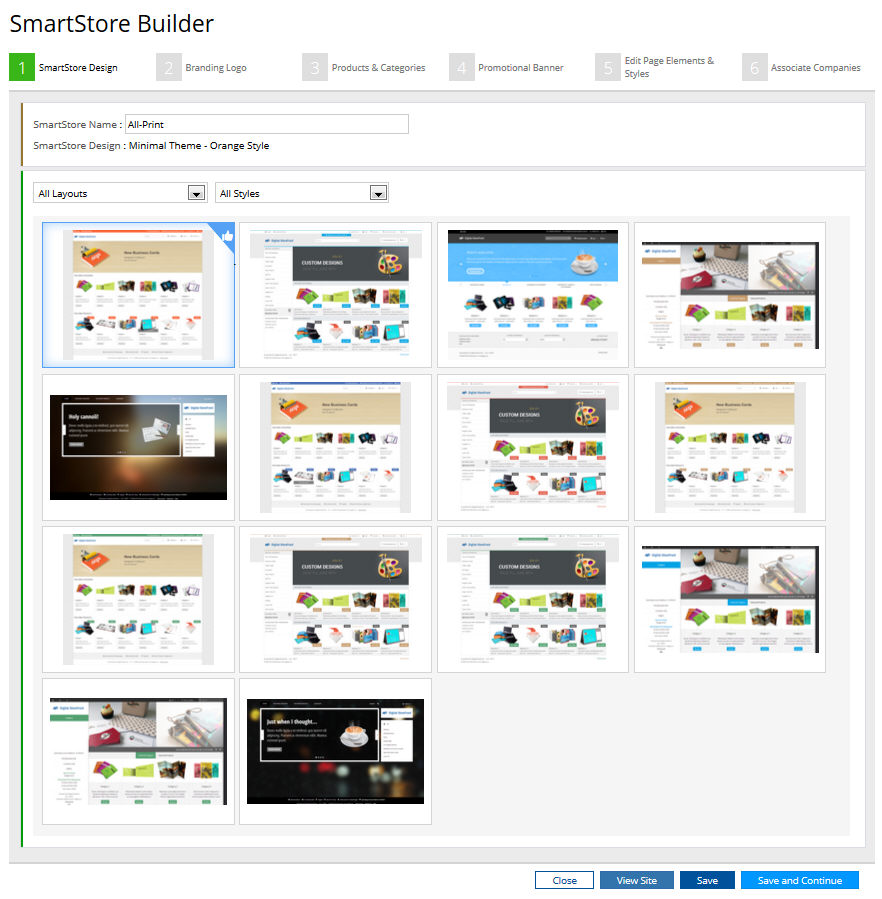

 1:
SmartStore Design - Choose a Design
1:
SmartStore Design - Choose a DesignThe first step is to select the overall theme (style and layout) of your SmartStore from the available options. MarketDirect StoreFront ships at present with five basic site themes. Each layout has several color themes and was designed to suit a particular storefront type. For instance, the Silk theme shown below is ideal for sites that want to highlight only a small number of products in a dynamic display.
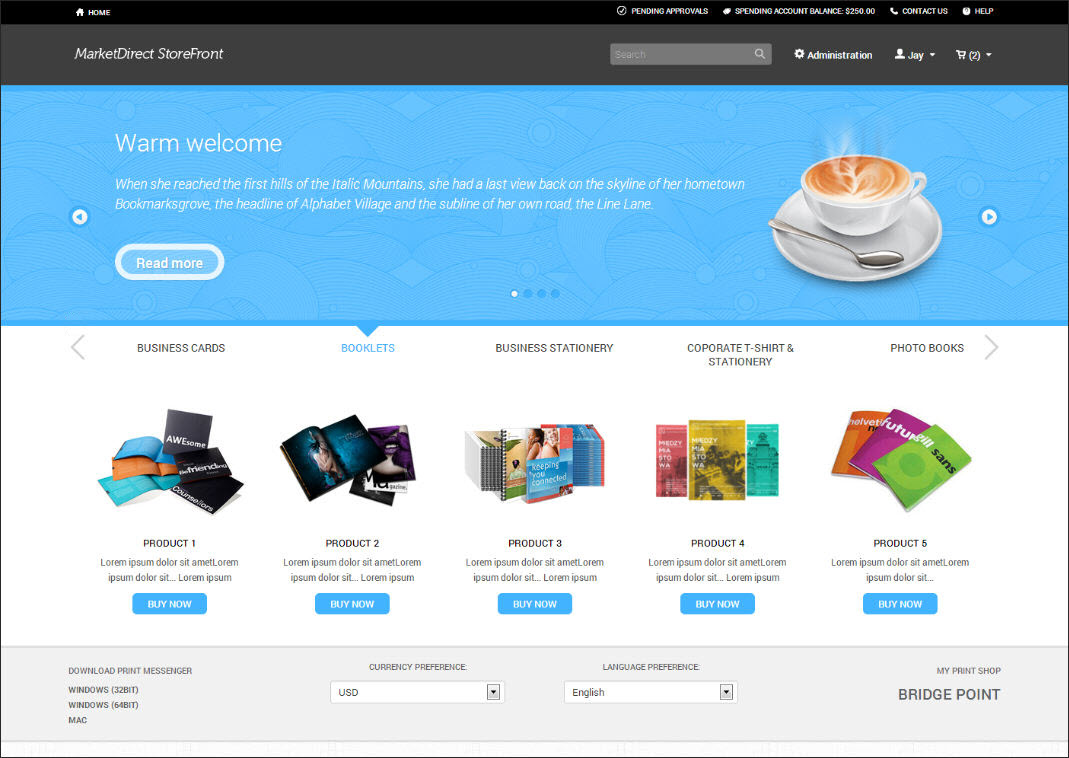
The Minimal theme, with its prominent display of featured categories and products and large carousel-type promotional banner, works well for sites with large or small product sets.
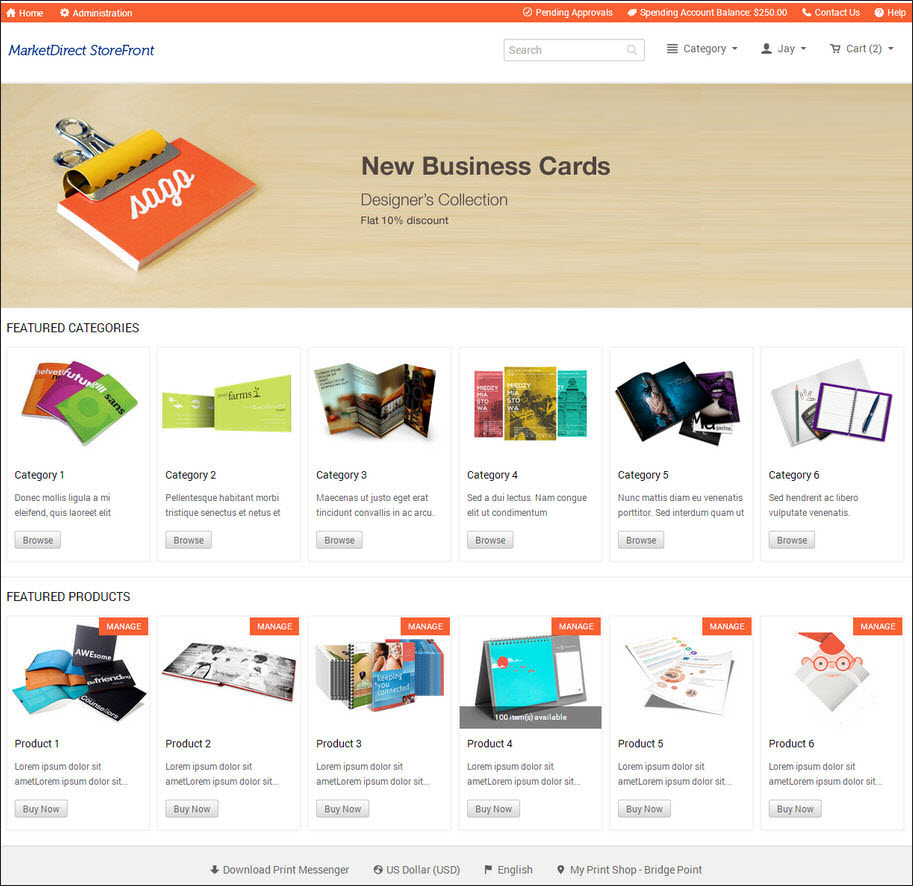
The Mosaic theme is a great layout for sites with a handful (8-12) of products to highlight.
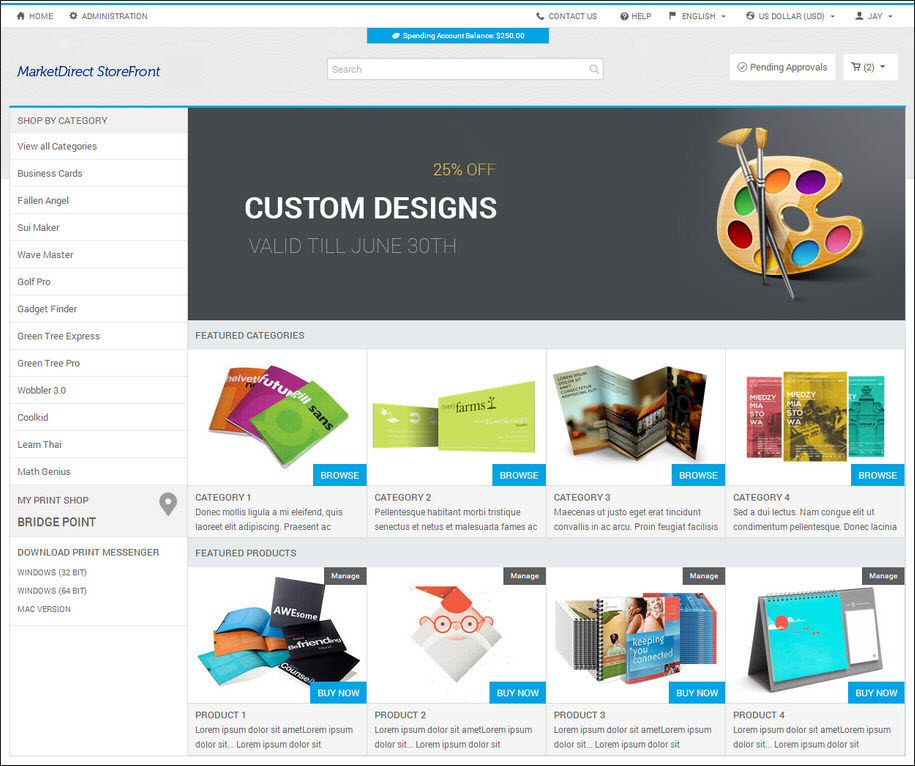
The Matrix theme is similar to Mosaic but lets users toggle between featured categories and featured products in a fluid layout.
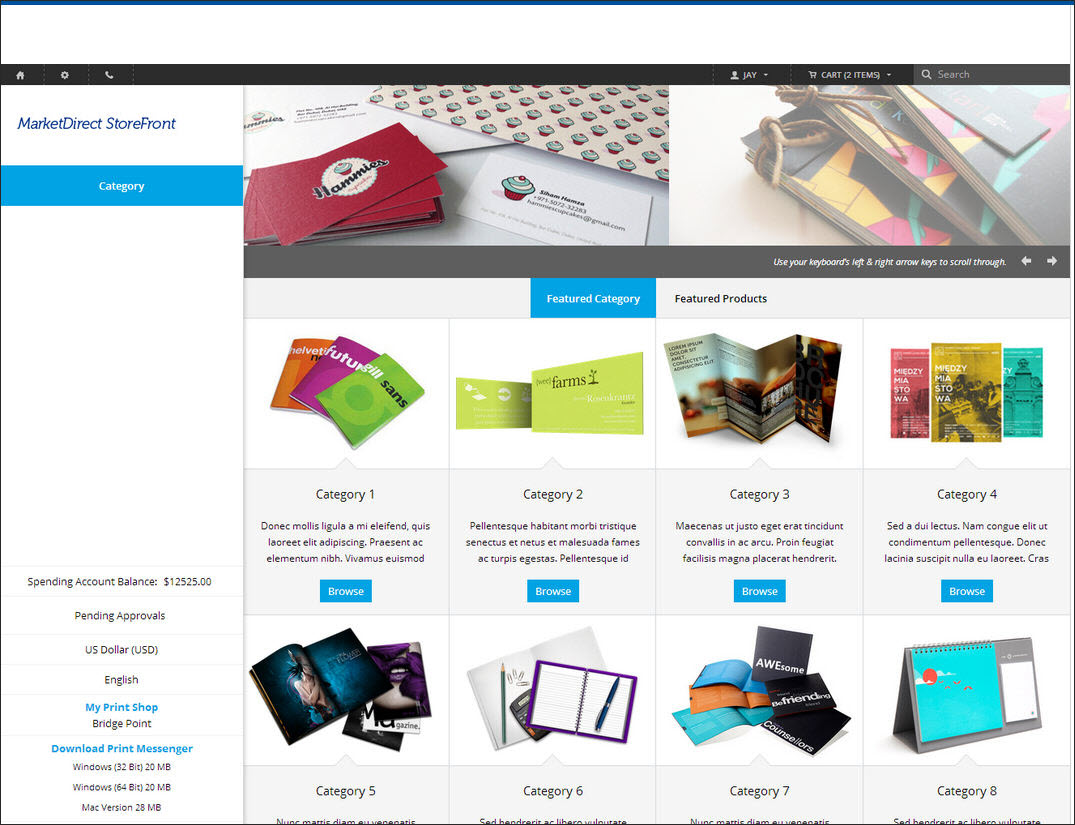
The Magic theme is ideal for sites that want to lead with a targeted message.
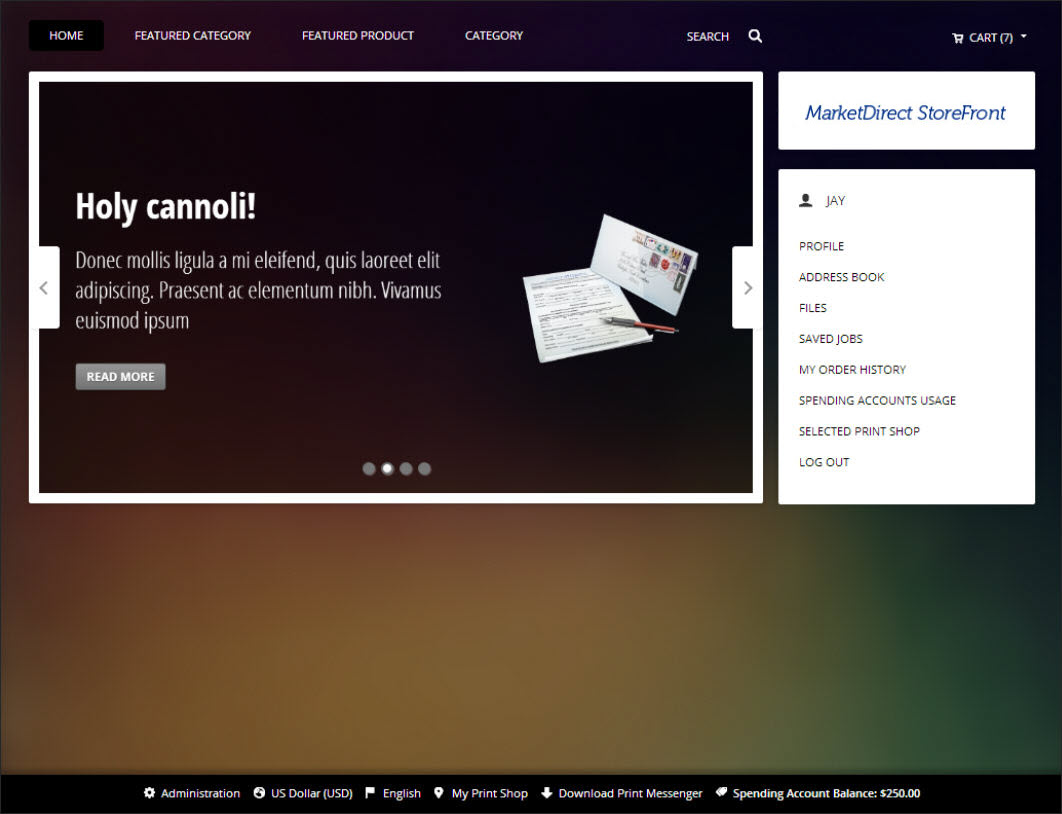
For guidance on which design to choose, after
selecting a layout, click one of the available styles and then hover
your pointer over a design and click View.
The description of the design will help you decide if it suits your
needs for the storefront.
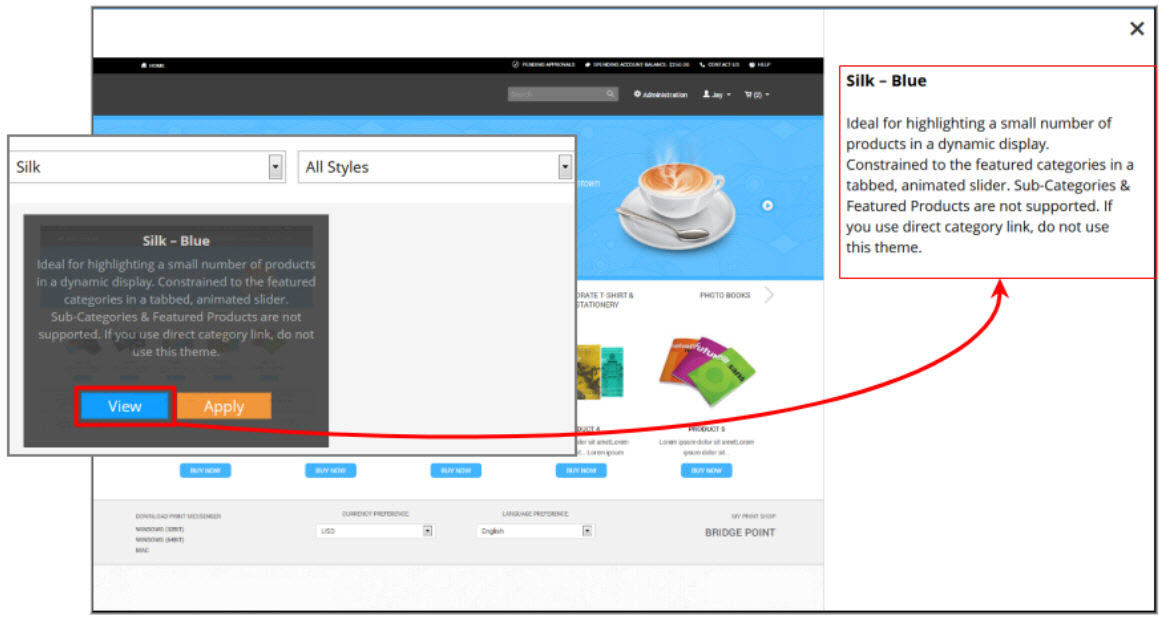
1 Select the overall design (style and layout) for the SmartStore, each of which has several color theme options, from the available options by clicking thumbnail images on the page.
As the number of designs grows, you can
use the All Layouts and All Styles pull-down lists:
--From the All Layouts pull-down
list, select a layout type. The default selection is All
Layouts.
--From the All Styles pull-down
list, select a style type. The default selection is All
Styles.
● Click View for a closer look at the design.
● Click Apply to apply the design to the storefront.
The selected design with have
a thumbs-up logo in the upper right-hand corner.
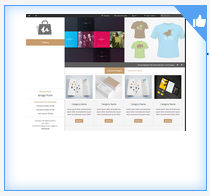
2 Click View Site to open a separate browser window that shows you how the design will appear to buyers.
3 Click Save to select the design for the storefront.
If you have made any changes to the storefront's
HTML or CSS styles (in 5: Edit Page
Elements & Styles), changing the storefront design will
cause those changes (such as any new page elements you added or edits
to the HTML code and CSS styles) to be lost. This action will not
affect other elements of the design (such as the branding logo, promotional
banner, products and categories). The action cannot be undone, so
any changes you made that are lost cannot be recovered.
You will have to confirm your decision to change the design and abandon
any changes you have made.
4 Click Save to save your changes or Save and Continue to go to the next step.
You can also click the 2 Branding Logo icon in the SmartStore Builder navigation menu at the top of the page.

 2:
Branding Logo - Choose a Logo
2:
Branding Logo - Choose a Logo1 In the Branding section: From the Type pull-down list, select the type of logo to add to the storefront:
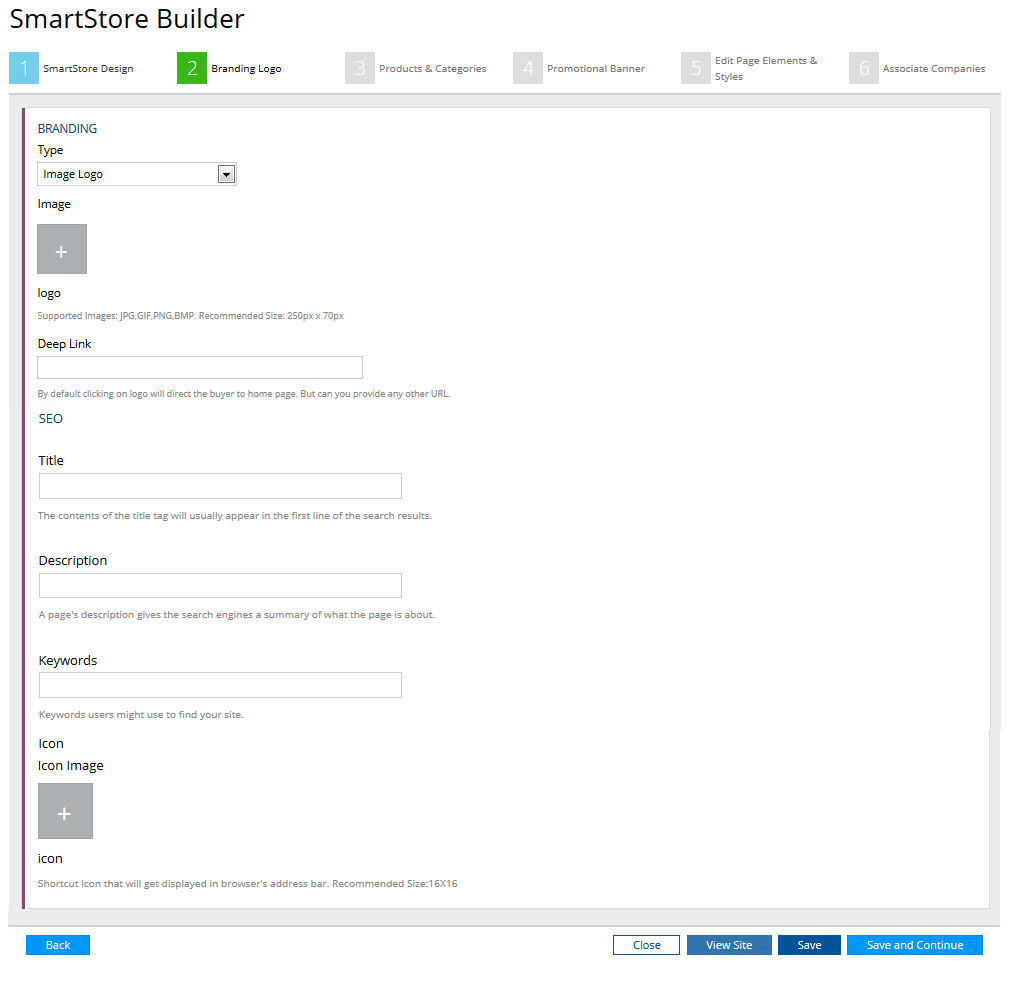
● Image Logo: Select this option to upload an image of your logo.
The supported image formats are
JPG, GIF, PNG, BMP.
The recommended size is 250 pixels by 70 pixels.
Image file size should not
exceed 2 MB.
The image logo will be displayed
on the banner of the page. For example, if you upload a graphic image
logo, it will be displayed on the banner as shown below:

● Click
the  .
.
● On the File Upload window, browse to and select the logo image.
● Click Open.
● Text Logo: Select this option to use a text logo for the storefront.
The text logo will be displayed on the
banner of the page. For example, if you enter "RentaPrint"
as your text logo, it will be displayed on the banner as shown below:
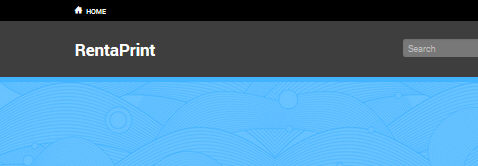
● In the Text entry box, enter the text for the logo.
● No Logo: Select this option if you do not want to display a logo on the storefront.
2 In the Deep Link field, enter a link to a Web page that you want to take buyers to when they click on the logo.
By default, clicking on the logo will direct buyers to your storefront home page.
3 To improve the accessibility and ranking of your SmartStore site on the Web via Search Engine Optimization (SEO), complete the fields below to make your site indexable by Internet search engines such as Google:
● Title: Add a descriptive title for your site instead of the generic default "Storefront." This title will typically be shown in the first line of your site's entry on the search results page.
The title of existing SmartStores created before upgrading to MarketDirect StoreFront v. 7.4 will default to the name of the SmartStore.
● Description: Add a descriptive summary of your SmartStore that will be shown beneath the title and URL of your site on the search results page.
This is the descriptive blurb that tells the searcher what your site has to offer with the search terms that matched the users' search terms bolded. Tell the prospective buyers what your site has to offer. Be sure to include any deals, specials, distinctives, or discounts on your products and services to draw buyers to your site (e.g., "Superior Printing offers top-quality printing at guaranteed lowest prices! We offer expert design, mailing, and direct marketing services...").
● Keywords: Enter keywords for your site. Keywords are those terms that prospective buyers looking for the services you offer will be most likely to enter into an Internet search engine such as Google, Bing, or Yahoo!
In addition to including keywords that list your product and service offerings, you might want to include your location if you have a physical location or outlet.
● Icon: To add an icon that will be displayed in a Web browser tab along with the title of your site when a page of your SmartStore is open:
● Click
the  .
.
● On the File Upload window, browse to and select the icon image (the recommended size is 16x16 pixels).
● Click Open.
4 Click Save to save your changes or Save and Continue to go to the next step.
You can also click 3 Products & Categories icon in the SmartStore Builder navigation menu at the top of the page.

 3:
Products & Categories - Associate Products & Categories with the
Storefront
3:
Products & Categories - Associate Products & Categories with the
Storefront1 Check the Show all default Products & Categories check box if you want to display all products and categories that are published to the default storefront. Unchecking this option will allow the administrator to manually choose categories and products for the catalog.
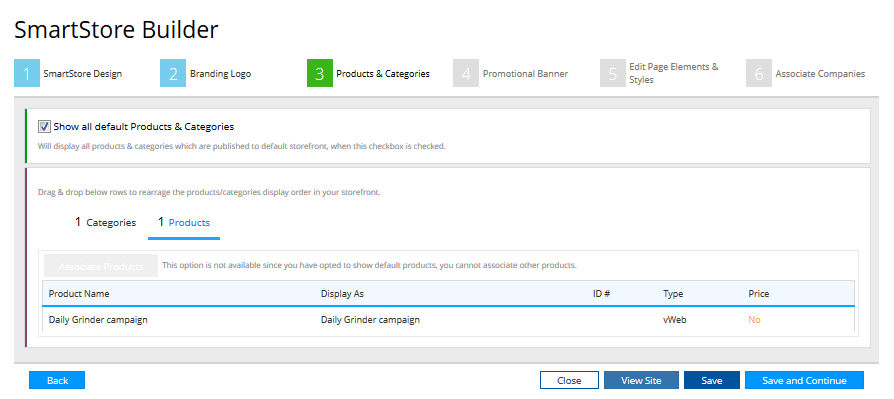
The list of products and categories will stay synchronized with changes to the default storefront. So if you include default products and categories on other (non-default) storefronts, the changes made to the products will be applied across storefronts. (See To set a storefront as the default for more information on default storefronts.)
2 To associate categories with the storefront:
● Click Categories (which is preceded by a number representing the number of categories currently associated with the storefront).
● On the Add Featured Categories window, select the categories you want to feature on the storefront.
● Click Save.
● To
remove a category, click the trash icon  on the
row of the category to remove.
on the
row of the category to remove.
● To re-order the categories, left-click on the category and without releasing the mouse button drag the category up or down in the list.
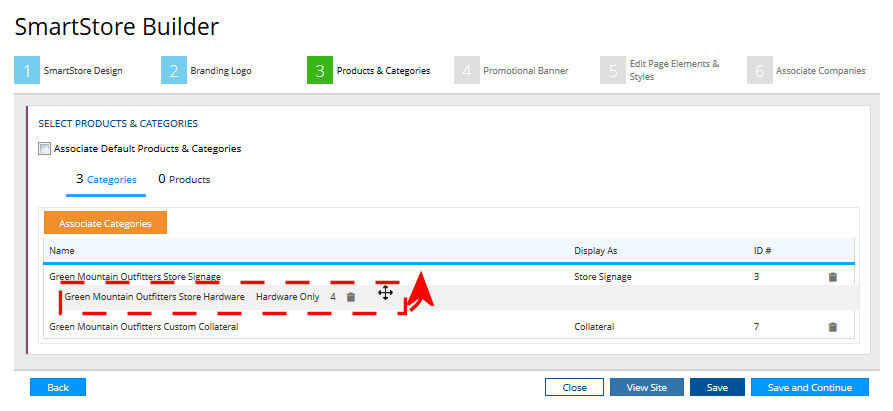
3 To associate products with the storefront:
● Click Products (which is preceded by a number representing the number of products currently associated with the storefront).
● On the Add Featured Products window, select the products you want to feature on the storefront.
● Click Save.
● To
remove a product, click the trash icon  on the row
of the product to remove.
on the row
of the product to remove.
● To re-order the products, left-click on the product and without releasing the mouse button drag the product up or down in the list.
4 Click Save to save your changes or Save and Continue to go to the next step.
You can also click 4 Promotional Banner icon in the SmartStore Builder navigation menu at the top of the page.

 4:
Promotional Banner - Configure a Banner
4:
Promotional Banner - Configure a BannerThe Promotional Banner is displayed prominently at the top of the storefront home page. The look of the banner will vary depending on which theme you chose. The images below show the 5 main types of image banners.
The supported image formats are JPG, GIF,
PNG, BMP.
Image file size should not exceed
2 MB.
1 From the Upload Type pull-down list, select the type of promotional banner to add to the storefront:
● No Promotional Banner: Select this option if you do not want to display a promotional banner on the storefront.
A preview of the promotional banner you design will be shown at the bottom of the page. You can also click View Site at the bottom of the page at any time to see how your site will look.
● Image: Select this option to upload an image to be displayed as the promotional banner on the storefront.
The supported image formats are
JPG, GIF, PNG, BMP.
Image file size should not exceed
2 MB.
Transparency is supported on GIFs
and PNGs. In the example below the "Hot Deals" banner is
a GIF with the yellow background set to be transparent.

The image below shows how the banner will be shown on the storefront
with transparency applied to the yellow background.
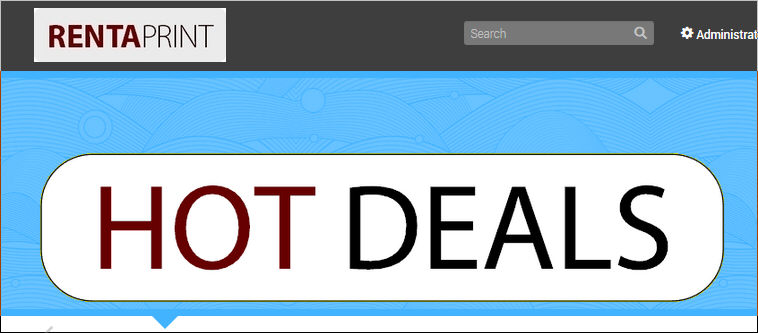
● Click
the  .
.
● On the File Upload window, browse to and select the promotional banner image.
● Click Open.
● Deep Link: Enter a link to a Web page that you want to direct buyers to when they click on the logo.
● Text: Select this option if you want to use a text-only promotional banner. Enter the text in the Text entry box and format it using the formatting tools.
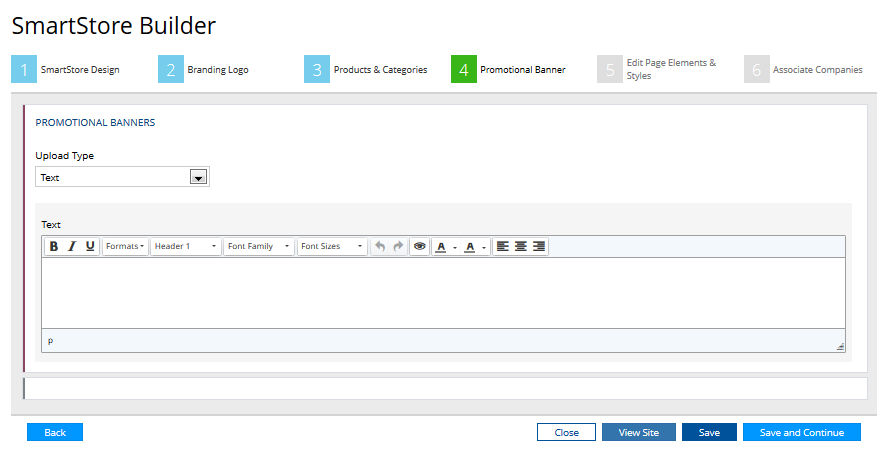
● Carousel
Slider: Select this option to upload
two or more images that will be displayed sequentially like a slideshow
and that can be advanced by buyers' clicking the forward  and back
and back  arrows.
arrows.
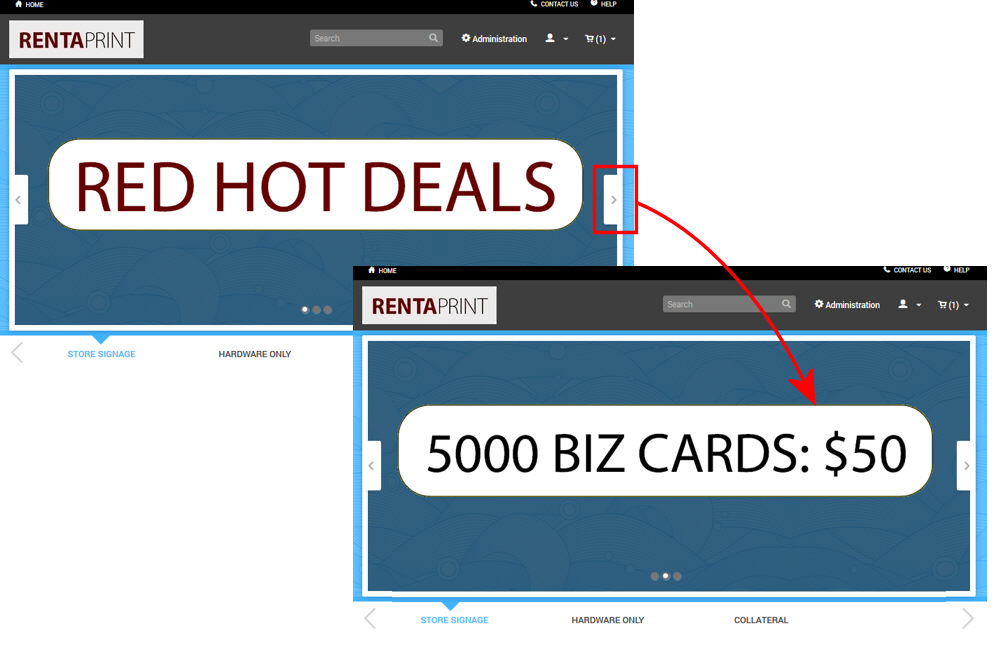
The supported image formats are
JPG, GIF, PNG, BMP. Transparency is supported on GIFs and PNGs.
Image file size should not exceed
2 MB.
● From the pull-down list, select the Carousel Type.
The carousel types available will depend
on which SmartStore design you chose. A thumbnail of the selected
carousel type will be shown in the thumbnail pain.
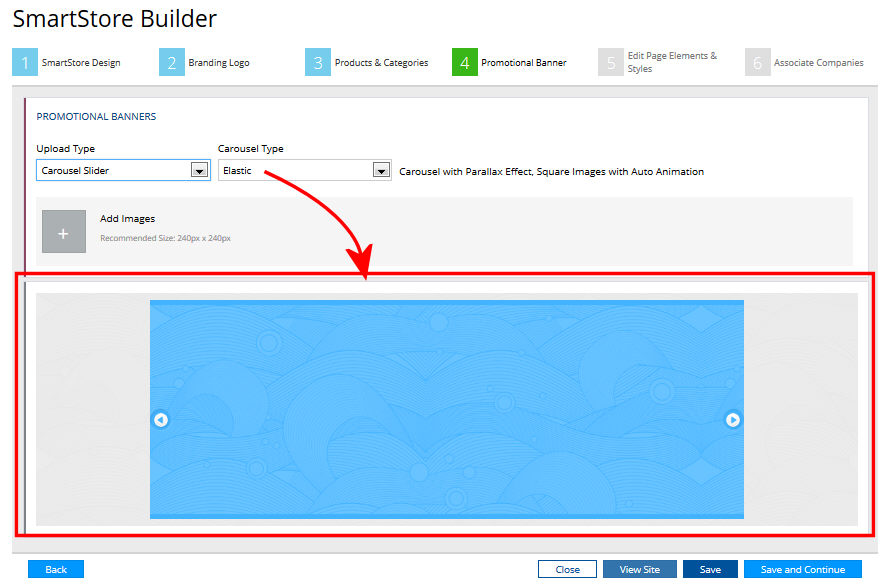
● Click
the  .
.
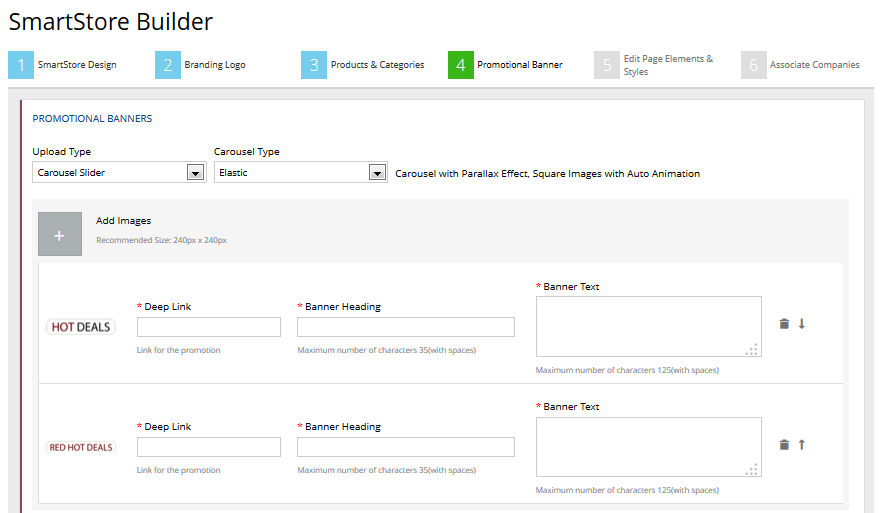
● On the File Upload window, browse to and select the promotional banner images you want to include on the carousel.
You can select multiple images.
● Click Open.
● On the Promotional Banners page:
● Deep Link: Enter a link to a Web page that you want to direct buyers to when they click on the image.
● Banner Heading: Enter a banner heading. This is the headline for the text. Entering a banner heading will cause a READ MORE button to be shown beneath the banner text or image.
● Banner Text: Enter any text you want to be displayed in this slide of the carousel.
● To
remove a category, click the trash icon  on the
row of the promotional image.
on the
row of the promotional image.
● To
move the banner up or down (i.e., make it show before or after the
other images in the carousel), use the up and down icons  .
.
2 Click Save to save your changes or Save and Continue to go to the next step.
You can also click 5 Edit Page Elements & Styles icon in the SmartStore Builder navigation menu at the top of the page.

 5:
Edit Page Elements & Styles
5:
Edit Page Elements & StylesThe Advanced Customization tools for SmartStores offer unprecedented and nearly unlimited control over the layout, styling, and content of the site. In giving site administrators and their designated Web design personnel access to the CSS styling and HTML code behind the storefront, SmartStores offer ultimate control over the "look and feel" of the site. That power, however, is not without risks, so please read the message below before continuing.
IMPORTANT
The advanced customization functionality in the Edit Page Elements
& Styles section is intended for advanced users who are familiar
with HTML code (the mark-up language on which Web pages are based)
and CSS (Cascading Style Sheets), which define how text and other
page elements on the storefront are displayed.
Making changes using the tools in Advanced Customization can result
in problems with the way your site looks and behaves and even render
your site non-functional. If such problems arise, there is an option
to revert the site (pages, templates, and CSS) to the default. Doing
so, however, will cause you to lose any and all changes you have made
using the advanced customization tools and the revert action cannot
be undone. Reverting to the default will cause all advanced customization
changes to be lost, including changes to the CSS styles or HTML elements,
addition of new template sections, changes to the order in which page
sections and templates are arranged, etc. Reverting to the default
will not cause changes done in other storefront customization pages
to be lost, such as selection of theme and design, branding (logo),
products & categories, promotional banner, or company association.
You will be required to agree to the statement: "Revert all
edits made to page elements in this page including HTML changes and
CSS styling. Any new page elements added to this page will be deleted.
This action cannot be undone. This action will not affect other areas
like SmartStore design section, branding (logo) etc." Thus, after
the site is restored to the default version, you will have to redo
any customizations you completed using the advanced customization
tools.
PLEASE
NOTE If you make
changes that adversely affect your site that cannot be resolved by
reverting to the default and that require an ePS Professional Services
engagement, you may be charged for the service.
Many primers on HTML and CSS are available free of charge on the Internet
(search "HTML Introduction" and "CSS Introduction"
in the search engine of your choice). If you are not an advanced user
and wish to retain the services of ePS Professional Services team
for assistance with HTML or CSS, please address your request to ePS
MarketDirect StoreFront
Technical Support team.
● LOGIN BLOCK
● Allow buyer to register: This will cause the Register link to be shown in the login section.
● Show Forgot Password link: This will cause the Forgot Your Password? link to be shown in the login section.
● Remember User Name check box: This will cause the Remember User Name checkbox to be shown in the login section.
● Allow buyer to checkout as guest: This will cause the Checkout as Guest option to be shown in the login section.
Notes
on Guest Checkout:
- Guest checkout will be available only for priced products (not those
that require manual quote).
- If you have visual verification (Captcha) enabled, guest buyers will
be subject to it when using guest checkout.
- If your site is integrated with ESC (External System Connector) or
an MIS, be aware that guest account orders may be communicated from
MarketDirect StoreFront.
- Guest buyers will be subject to the regular checkout process even
if very rapid checkout is enabled (because the latter does not request
a shipping address).
Guest Checkout Workflow:
If you select the Allow buyer to checkout
as guest, guest users will be able to complete a purchase and
checkout without logging into your site through a one-time guest user
account. After selecting a product and clicking Proceed
to Checkout, the guest buyer will be prompted either to login
or checkout as guest.
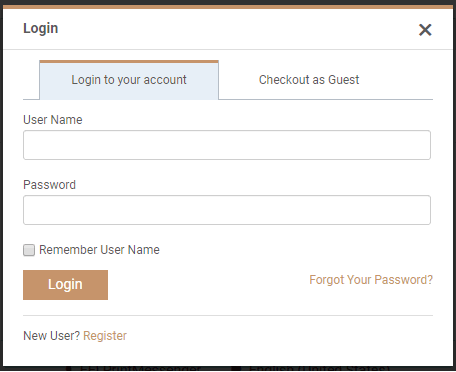
Clicking Checkout as Guest
will prompt the guest buyer to enter a valid email address.
The system will validate the format of the email address entered. This
email address will be used to communicate email notifications throughout
the order process.
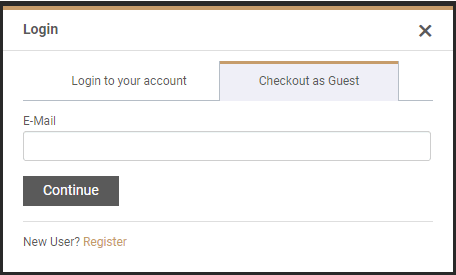
The guest buyer will then be able to complete the purchase using one
of two payment options (credit card or pay at store) and choosing
a shipping option you have made available to the company.
This Add to Cart Behavior section will be disabled if there is a conflict on CSS style sheet that has not been merged. A message will indicate why it is disabled. The section will be enabled once the style sheets are merged. On category setting page, a static message will be shown that warns about the storefront customization. The message cannot be shown or hidden based on style sheet conflict because the same category can be published to multiple storefronts; thus, it will always be shown.
● Add + Continue Shopping: This assumes that after buyers add an item to the Cart, they want to continue shopping and not go directly to the Cart to checkout.
● Add + Goto Cart: This assumes that after buyers add an item to the Cart, they want to proceed immediately to the Cart and checkout.
● HEADER TAG
● Paste javascript from a third-party service into the Header Tag field to add custom functionality such as a cookie consent widget other than the MarketDirect StoreFront version, an email newsletter sign-up widget, or Google Analytics tracking for your StoreFront.

You can add as many header tags as you want to the Header Tag box.
To ensure a secure site, the following JavaScript tags are not supported with the Header Tag functionality: Alert, Confirm, and Prompt. When combined with other scripts, these tags can be used to inject cross-site scripting vulnerability into the application.
● COOKIE CONSENT
● Enable Cookie Consent: Select this option to show the cookie consent widget on the buyer side of your SmartStore, where buyers can set their cookie consent preferences. Enabling this field allows you to better comply with consumer privacy regulations.

SmartStore buyers will be able to change their
Cookie Consent preferences
in the Privacy Overview window by clicking the Cookie
Consent link in the SmartStore
footer.

● There are two types of cookies stored on your SmartStore:
● Necessary Cookies are necessary for buyers to use your site and must always be enabled.
Necessary Cookies enable core functionality for your StoreFront including security, network management, and accessibility.
● Analytical Cookies are optional Google Analytics cookies that collect information on how the buyer interacts with the SmartStore.
The buyer will be asked to update their Cookie Consent preferences either every 180 days, when a new MarketDirect StoreFront version is released, or if Google Analytics / Tag Manager is activated at the site level.
● PUBLISHED PRODUCTS
● Items per page (maximum 25): Specify the number of products (1-25) per page to show on the storefront before the page must be scrolled.
● SHOPPING CART CONFIGURATION
● Display x Products: Specify the maximum number of products (1-11) to show in the Mini Shopping Cart in the storefront. If the cart has more than the selected number of products, the buyer will need to open the cart to see all items.
For instance, say you have specified 5 as the maximum number of products, and a buyer has added 8 items to their cart, the mini cart will still show only 5 and the buyer will have to go to the cart to see all 8 items.
● Show 'Final Width & Height' in Shopping Cart: Select this option to show the final width and height of a product in the shopping cart.
● TAXES SETTINGS
This section will be shown only if you are not using VAT taxation. The field below applies only if you are using MarketDirect StoreFront's built-in tax engine. Item level tax is not supported with CCH SureTax, so please make sure this check box is not selected. For more information on MarketDirect StoreFront's built-in tax engine, see Built-in Sales Tax Model.
● Show item level tax in Shopping Cart: Select this option to show item-level taxes in the shopping cart.
This section will be shown only if you are using VAT taxation. For more information, see VAT Taxation Model.

● Price for anonymous buyers:
● Ask: Select this option to ask anonymous buyers whether to show prices including or excluding VAT in prices.

For example, consumer users will likely opt to show prices with VAT, whereas business users will not.
Note that for anonymous (pre-login) buyers, the Print Shop location is used to calculate the VAT rate.
● Include VAT: Select this option to include VAT in pricing.
● Exclude VAT: Select this option to exclude VAT in pricing.
● Allow users to enter VAT number: Select this option to allow buyers who self-register on the site to enter their VAT numbers and have them associated with their profile and utilized during the ordering process.
● Show item level VAT amounts in Shopping Cart: Select this option to show the actual calculated VAT amounts at the item level in the Shopping Cart.
● Show item level VAT rate in Shopping Cart: Select this option to show the VAT rate at the item level in the Shopping Cart.
● Sort first by display priority, then by name: This will cause catalog items to be displayed in order of priority you specified on the Categories page.
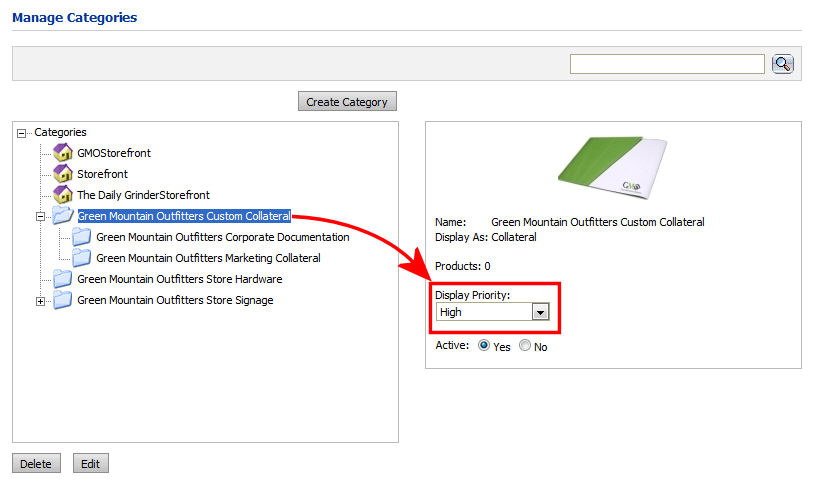
● Sort only by name: This will cause the system to ignore any priorities you specified on the Categories page and instead list the categories in alphabetical order by name.
● Enable Fulfillment Shopping: This will cause buyers to be presented with fulfillment shopping options on the storefront.
● Enable List View (i.e., Table): This will cause the products to be presented to buyers in a table format.
This can facilitate easy selection of multiple products that buyers can add to their shopping cart at once using Add All to Cart. If you do not select Enable List View, the products will be displayed in grid view (the standard "block style").
● Enable Rental Shopping: This will cause buyers to be presented with rental shopping options on the storefront.
Rental Shopping items include the added feature of searching for the availability of item by date range.
● TERMS AND CONDITIONS
● Default: Select this option to enable the default MarketDirect StoreFront terms and conditions statement on your storefront.
● Customize Text: Select this option to enter a custom terms and condition statement in the text box.
The text box
offers different text editing options such as text emphasis (Bold, Italics,
Underline), font family, and alignment. You can
see the buyer side text output, by clicking the Preview
icon. Make sure you click
Save
when you are done editing the text, or
your changes will be lost
if you exit the page or select a different language from the drop-down
list.
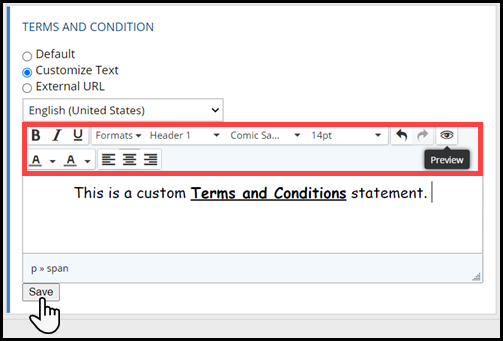
Choose
a language from the drop-down list to enter a translated terms and
conditions statement into the text box. This statement will only be
available when the buyer enables their storefront for the selected
language.
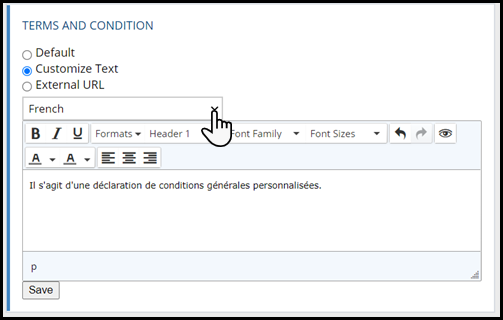
● External URL: Select this option to enter an external URL that will open in a new tab when the buyer clicks the Terms and Conditions link.


 Use
the advanced customization tools
Use
the advanced customization tools1 If you are an advanced user proficient in HTML and CSS and understand the risks, click Click Here to Enable Advanced Customization.
2 Read the disclaimer—"I understand that the changes made to this page will affect the appearance of the site and the vendor will not be held responsible for any design issues"—and then click I Agree if you want to continue.
3 Follow the steps in the sections below to learn about the layout of SmartStores and available editing tools and complete various customization tasks.
Before you begin customizing a SmartStore you should understand how SmartStores are constructed. SmartStores consist of pages, sections, sub-sections, and elements (HTML).
● Pages: SmartStores consist of many pages, such as StoreFront, Shopping Cart, and various pop-up message pages.
● Sections: SmartStore page contain one or more sections. For example, the Storefront page will typically contain at least Header, Body, and Footer sections.
● Sub-sections: Each main page section
can contain sub-sections, each with its own governing CSS styles.
For example, a Header can include two sub-sections—a Top Bar and a Secondary Bar.

● Elements: Each page sub-section will contain one or more HTML elements that determine the layout and content of that section.

 Overview
of the Advanced Editing Tools
Overview
of the Advanced Editing ToolsThe advanced customization page provides access to various tools you can use to edit your SmartStore's look and layout by making changes to the underlying HTML code and CSS styles.
The main elements on the advanced customization page are: 1 - the page selector and device view, 2- the global editing tools, and 3 - the page section editing tools.
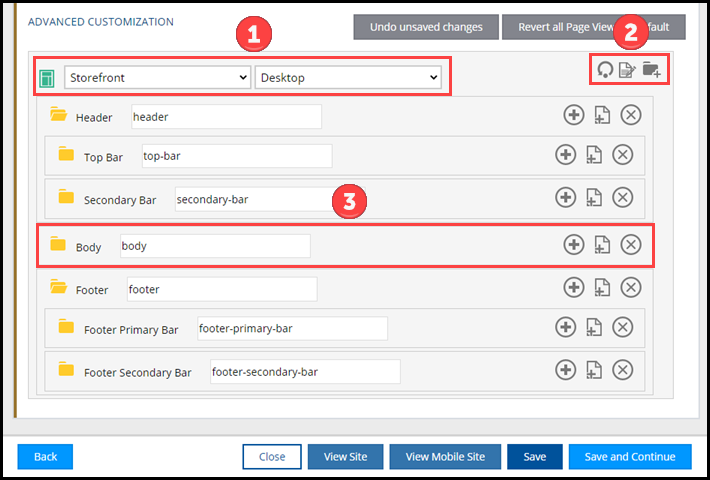
1 - Page Selector: Choose the page template you want to edit from the drop-down list
The default template page is Storefront. This template governs the main SmartStore storefront page on the buyer side of your site. Each template has four main sections: Header, Body, Miscellaneous Bar, and Footer.
1 - Device View: Choose the device view you want to edit from the drop-down list.
Device View allows you to edit the look and feel of either the desktop or the mobile views of your storefront. You can apply CSS edits made to the desktop view of your storefront to the mobile view by clicking the Apply Changes to Mobile check-box in the Edit Style window. HTML changes must be applied to the specific Device View.
2- Global Editing Tools: The three global controls that govern the page template are Revert, Edit CSS, and Add Page Section.
●  Revert: Click to cancel all changes
you have made to the HTML and CSS for the selected page and revert
to the default. Choosing this option will also result in the deletion
of any new page elements you added to the page.
Revert: Click to cancel all changes
you have made to the HTML and CSS for the selected page and revert
to the default. Choosing this option will also result in the deletion
of any new page elements you added to the page.
Warning: This action cannot be undone.
You will be asked to confirm your decision: "Revert all edits made to page elements in this page including HTML changes and CSS styling. Any new page elements added to this page will be deleted. This action cannot be undone. This action will not affect other areas like SmartStore design section, branding (logo) etc."
● Click Cancel to undo all of the changes you have made to the page elements on this page.
● Click Save to keep any changes you have made to the page elements on this page.
●  Edit CSS (Cascading Style Sheet):
Click to edit the style sheet for your storefront. Each SmartStore
storefront has a single CSS (cascading style sheet) that defines all
styles for the storefront. Make your changes directly on the style
sheet.
Edit CSS (Cascading Style Sheet):
Click to edit the style sheet for your storefront. Each SmartStore
storefront has a single CSS (cascading style sheet) that defines all
styles for the storefront. Make your changes directly on the style
sheet.
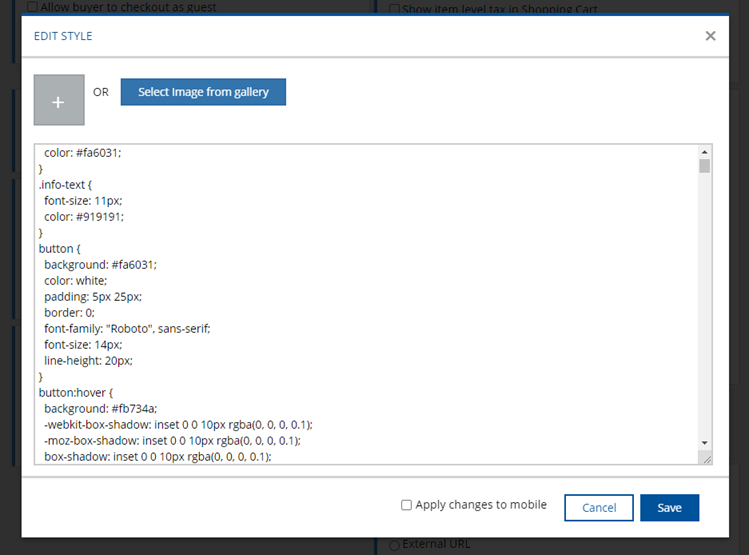
● Select the Apply changes to mobile check-box to apply the edits to the mobile view of the storefront.
● Click Cancel to undo all of the changes you have made to the CSS.
● Click Save to keep any changes you have made to the CSS.
●  Add a Page Section: Click to add
a section to the selected page.
Add a Page Section: Click to add
a section to the selected page.
3 - Page Section Editing Tools:
All pages and sub-pages are made to expand and collapse (e.g., click the Header folder to expand or collapse the page elements beneath it; click the page elements such as Top Bar to expand or collapse the HTML snippets beneath it) and can be dragged and dropped to a new location in the layout tree, which will affect the order in which they are displayed on the storefront.
On the Advanced Customization page, the pages and elements are arranged in the order in which they appear on the storefront. You can change the order by dragging and dropping.
● ![]() : Click to add a sub-section to the page section.
: Click to add a sub-section to the page section.
●  : Click to either add or create an HTML page element for the section.
After creating a page element, the page element will appear with a
red asterisk that indicates that it is a change you have made (i.e.,
not part of the shipped SmartStore).
: Click to either add or create an HTML page element for the section.
After creating a page element, the page element will appear with a
red asterisk that indicates that it is a change you have made (i.e.,
not part of the shipped SmartStore).

● ![]() : Click to delete the section, subsection, or HTML page element.
: Click to delete the section, subsection, or HTML page element.
You can see the changes made to your storefront by clicking View Site for the desktop view or View Mobile Site for the mobile view.
Click
Undo Unsaved
Changes to
cancel all currently unsaved edits.
Click Revert
All Edits & Styling to
revert the page back to the default look and feel.


 Edit
the CSS Styling for the Storefront
Edit
the CSS Styling for the Storefront Each SmartStore storefront has a single CSS (cascading style sheet) that defines all styles for the storefront.
Each class or ID in the HTML corresponds with a CSS entry, which defines how all instances of that class look or behave:
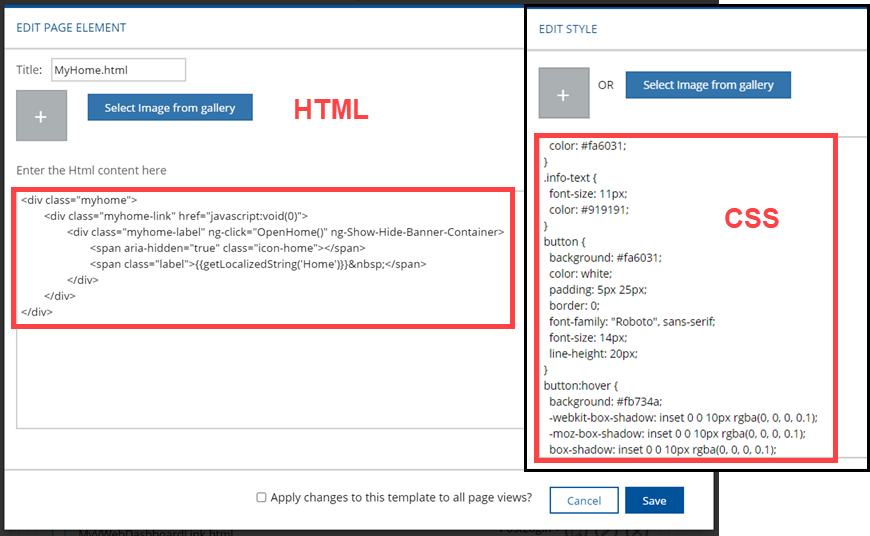
HTML cannot hard-code data and content that will be generated dynamically by the .Net code, such as the product listing, which is variable and subject to change. MarketDirect StoreFront handles this by inserting logical tags that we call "dynamic content tags" (DCT).
These are a critical part of editing HTML. Please be careful not to delete any of these DCTs when you are editing your SmartStore's HTML. If you delete these tags: you can revert the page, revert the storefront, re-code it if you have written it down for safe keeping (or printed the code), or look for it in another storefront and copy it.
These dynamic content tags are set off in double angled brackets: {{ ... }}
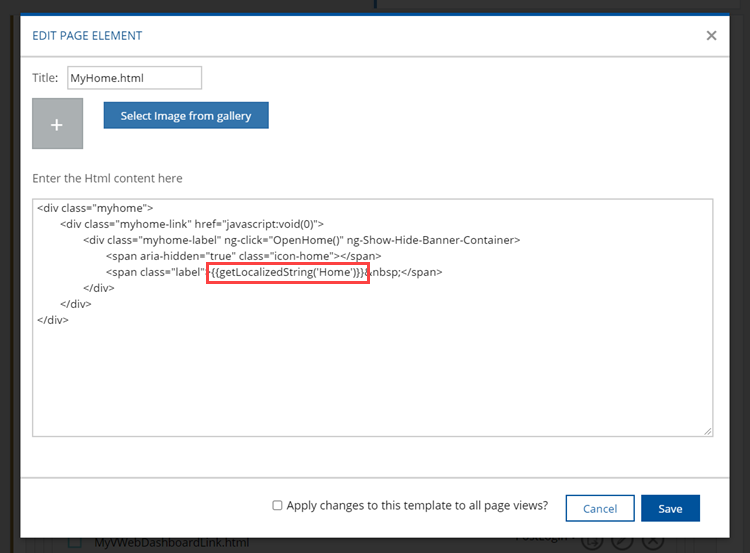
Warning: Support cannot help with HTML related issues.
1 Click
the CSS editor icon  to open the style sheet.
to open the style sheet.
You can copy the style sheet and paste it into an external CSS editor of your choice to use advanced editing tools, color format code, etc. Make a personal backup of the CSS style sheet to keep older versions of changes. Using an external editor will make it easy to save revisions. This will help prevent you from having to use the revert button and lose all changes you have made.
2 To add an image to the style sheet, either:
● Click Select image from gallery and then, on the Storefront Template Image Gallery, click the image to select.
or
● Click
the add image icon  .
.
● On the File Upload window, browse to and select the logo image.
● Click Open.
3 Examine the style sheet and make any changes directly on the style sheet.

4 Select the Apply changes to mobile check-box to apply the edits to the mobile view of the storefront.
5 Click Cancel to undo all of the changes you have made to the CSS.
6 Click Save to keep any changes you have made to the CSS.
Warning: Support cannot help with CSS related issues.
To discard the edits you have made to the CSS
1 To
discard all changes you have made to the CSS and revert to the default,
click the Revert  icon.
icon.
Warning: Note that choosing this option will discard not only all CSS edits you have made but also all changes you have made to the also result in the deletion of any new page elements you added to the page. This action cannot be undone.
You will be asked to confirm your decision: "Revert all edits made to page elements in this page including HTML changes and CSS styling. Any new page elements added to this page will be deleted. This action cannot be undone. This action will not affect other areas like SmartStore design section, branding (logo) etc."
2 Click Cancel to undo all of the changes you have made to the page elements on this page.
3 Click Save to keep all of the changes you have made to the page elements on this page.

 Edit
Page Sections, Sub-Sections, and HTML Page Elements
Edit
Page Sections, Sub-Sections, and HTML Page ElementsYou can add page sections and sub-sections to any SmartStore page.
To add a page section to a SmartStore page
1 Choose the appropriate page from the Page Selector drop-down list.
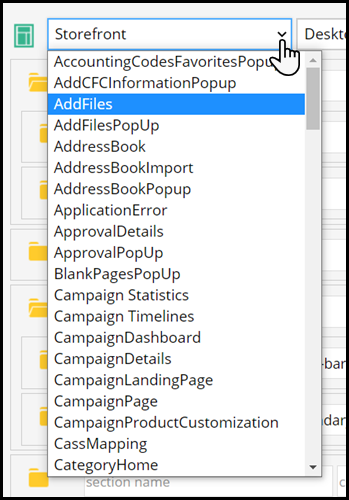
2 Choose the appropriate view from the Device View drop-down list.

3 Click the add
a page section icon  .
.
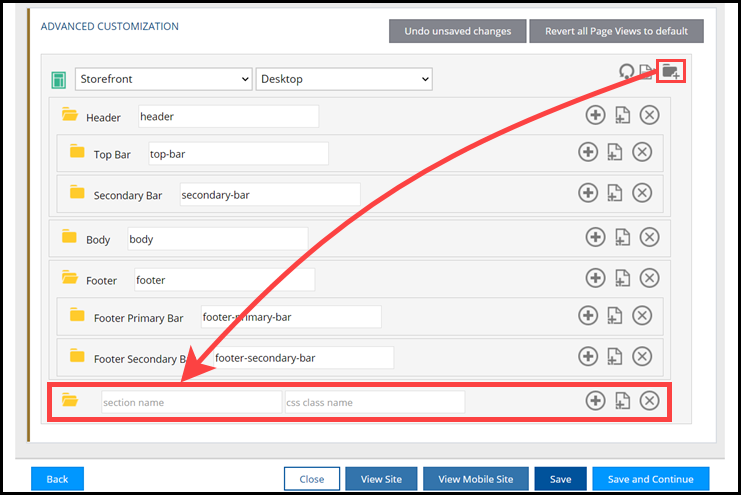
4 Enter a name for the page section.
5 Enter a CSS class name.
6 To add a page element for the page section:
● Click
 .
.
● Choose the appropriate option from the drop-down list.
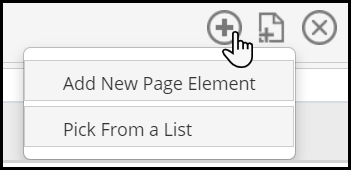
● Select Add New Page Element to open the Add Page Element window.
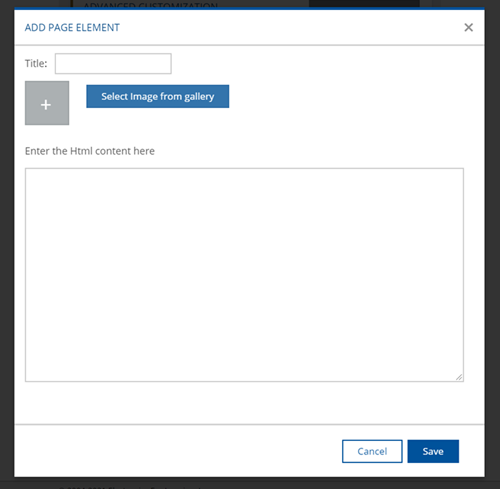
● Enter a Title for the page element, with the .html extension appended to the title.
● To add an image to the page section:
● Click
the add image icon  .
.
or
● Click Select image from gallery and then, on the Storefront Template Image Gallery, click the image to select.
● On the File Upload window, browse to and select the logo image.
● Click Open.
The supported image formats are
JPG, GIF, PNG, BMP.
The recommended size is 250 pixels by 70 pixels.
Image file size should not
exceed 2 MB.
● Enter the HTML code in the text box.
● Click Save.
● Select Pick From List to open the Add Page Element window.
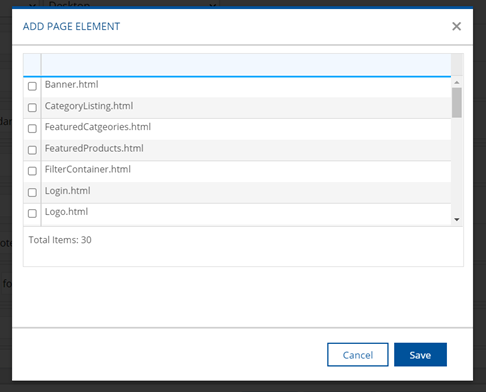
● Select the check-box for the appropriate page element in the existing page element list.
● Click Save.
7 To add sub-sections
to a page section, click ![]() .
.
To delete a page section from a SmartStore page
1 Choose the appropriate page from the Page Element drop-down list.
2 Click the remove
a page section icon ![]() on the page section row
to delete the page.
on the page section row
to delete the page.

 Edit
a Page Element
Edit
a Page ElementEach SmartStore section or sub-section has a page element that defines the content in the section.
1 On
the row with the page element you want to edit, click  to open the Edit
Template popup window.
to open the Edit
Template popup window.
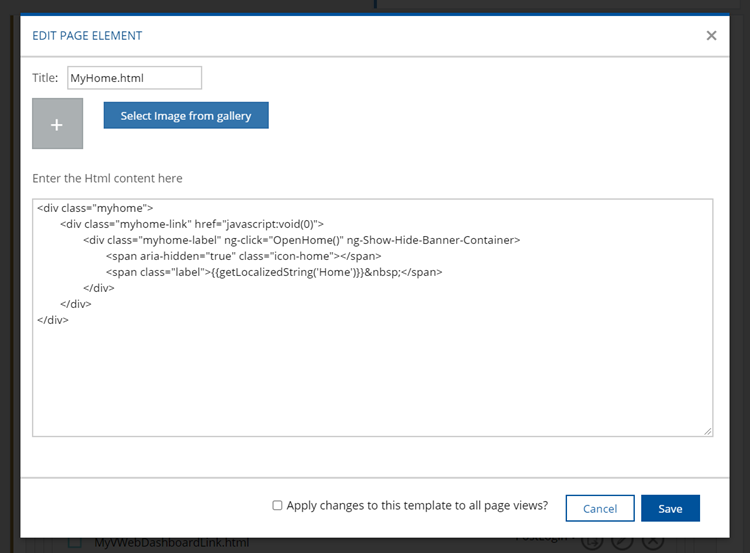
2 On the Edit Template page:
● You can edit the Title for the HTML element.
For HTML elements, the Title should have a .html extension.
● To add an image to the page section:
● Click Select image from gallery and then, on the Storefront Template Image Gallery, click the image to select.
or
● Click
the add image icon  .
.
● On the File Upload window, browse to and select the logo image.
● Click Open.
● Enter the HTML code in the text box.
You can also select the HTML in the Edit Template window and copy-and-paste it into the HTML editor of your choice to take advantage of the HTML editor’s advanced editing capabilities.
● If you want to apply the changes you made to the current template to all page views, click the check box.
● Click Save.
3 Select the display option for the HTML: Always, PreLogin, PostLogin.
This specifies whether the HTML element will be displayed at all times (Always) or only before a buyer logs in (PreLogin) or only after a buyer logs in (PostLogin).

 Restore
Your Site to the Default: Discard All Edits to the Storefront
Restore
Your Site to the Default: Discard All Edits to the Storefront1 If you want to discard all changes you have made to the storefront—including changes you have made to the HTML and CSS to all pages and page elements and any new pages or page elements you added to pages--and revert to the default, click Revert All Edits & Styling.
Warning: This action cannot be undone.
If you want to discard only any unsaved changes you have made, click Undo unsaved changes.
2 You will be asked to confirm your decision. Be sure to read carefully the information message that reads:
"Revert all edits made to page elements in all pages including HTML changes and CSS styling. Any new page elements will be deleted. This action cannot be undone. This action will not affect other areas like SmartStore design section, branding (logo) etc." Click Cancel or Revert all edits made to page elements in all pages including HTML changes and CSS styling. Any new page elements will be deleted. This action cannot be undone. This action will not affect other areas like SmartStore design section, branding (logo) etc."
3 Click Cancel or Revert.
4 Click Save to save your changes or Save and Continue to go to the next step.
You can also click 4 Promotional Banner icon in the SmartStore Builder navigation menu.

 6:
Associate Companies
6:
Associate CompaniesWhen you associate a storefront with a company,
all users in the company will see the customized storefront when they
login.
Please note that the list of companies will contain only those that
have not already been assigned to a storefront. To associate a company
with the storefront, you must first disassociate from the company
it is currently associated with.
1 To associate the storefront with a company, click Associate Company.

2 On the Associate Companies window, select the company(ies) to associate with the storefront.
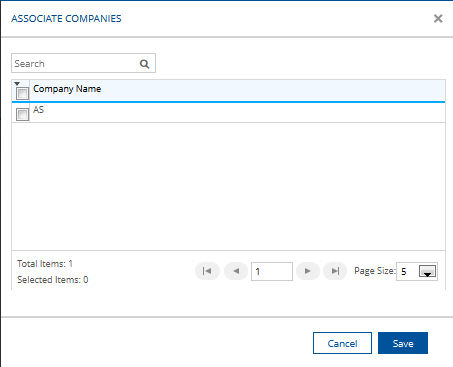
3 Click Save.
● Storefront Customization - Managing Storefronts
● Overview of Storefront Management - Customization
● To set a storefront as the default
● To view the companies associated with a storefront